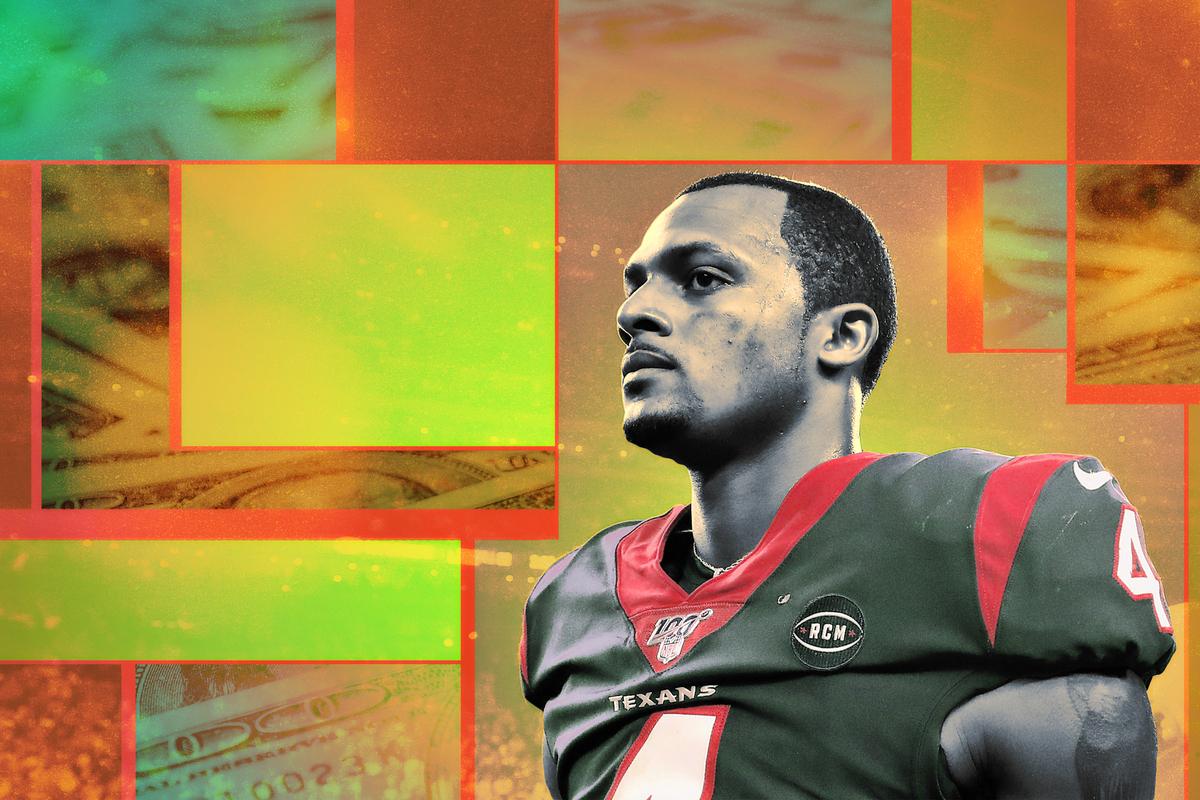
The Houston Texans have spent their offseason stumbling from one mistake to the next. Led by Bill O’Brien, the league’s only head coach who is also his team’s official general manager, the team’s front office has had a stretch that is nothing short of bewildering.
The Texans dealt franchise icon DeAndre Hopkins for a pittance after he asked for a new contract. Though the Hopkins deal was ostensibly about money, the team overpaid for potentially over-the-hill receivers Brandin Cooks and Randall Cobb to replace him. O’Brien flipped Jadeveon Clowney to Seattle for a package built around a third-rounder in August, sent that third-rounder to Oakland for cornerback Gareon Conley in October, and declined the fifth-year option in April for Conley to be under contract in 2021 for $10 million. Last month, the Texans were reamed in negotiations with their left tackle, Laremy Tunsil, who secured a deal so large (three years for $66 million) that it may establish an entirely new precedent in NFL negotiations. Tunsil did this without hiring an agent.
All in all, O’Brien turned Hopkins into Cooks and Cobb and Clowney into a cornerback the team declined to have under contract for 2021. The Texans do not have a first- or second-round pick next year. All of these bizarre moves make it fair to wonder if O’Brien is overwhelmed. But as baffling as Houston’s offseason has been, they’ve had good intentions. The next move on Houston’s horizon is the reason why the team made all those previous decisions: a contract extension for Deshaun Watson. While Houston’s offseason moves have been baffling, they make the most sense when viewed through the lens of trying to avoid past mistakes—even if they made new ones in the process.
Watson is not the most high-profile quarterback negotiating a contract extension in his own state. Dak Prescott’s negotiations with the Dallas Cowboys have gotten more buzz, but the Cowboys are unlikely to make inroads with Prescott before the July 15 franchise-tag deadline. If that day comes and goes without a deal, Prescott will play on the franchise tag for 2020 and the Cowboys will have to wait to sign him to a long-term extension in 2021. Next year may also be the timing for Patrick Mahomes. The Chiefs may alter the dynamics of the quarterback market with a potentially record-setting extension for Mahomes that may breach $40 million per year, but the Chiefs have no timetable for Mahomes’s negotiations. The Texans, however, reportedly want to extend Watson before the season begins, and several league executives believe Watson is next in line for a deal. All of Houston’s wild moves have been building to this moment. A new deal may make Watson the highest-paid player in league history.
Signing Watson to such a large deal will be new territory for the Texans. Since Houston was added to the league in 2002, the franchise has been wandering the quarterback desert. The franchise’s first pick, David Carr, is best remembered for getting sacked. Its longest-tenured quarterback, Matt Schaub, is best remembered for throwing pick-sixes. Yet Carr and Schaub are leaps and bounds better than the rest of Houston’s starters. If you want an idea of the team’s, uh, limited history at the position, take a gander at the top 10 quarterbacks by passing yards in Houston Texans history.
- Matt Schaub (23,221)
- David Carr (13,391)
- Deshaun Watson (9,716)
- Sage Rosenfels (3,380)
- Brock Osweiler (2,957)
- Brian Hoyer (2,606)
- Ryan Fitzpatrick (2,483)
- Case Keenum (2,195)
- Tom Savage (2,000)
- T.J. Yates (1,993)
Yikes. Brock Osweiler was so bad in his only season as a Texan that the team traded the Browns a second-round pick just to take him away, and he is in the Texans’ all-time top five by passing yards. While Houston has had stars ranging from running back Arian Foster to defensive end J.J. Watt to Hopkins, the first 15 years of Texans history were forgettable. Then Watson showed up. He was a college football legend at Clemson, revered by coaches, teammates, and fans. In three years as a pro, Watson has done just about everything a franchise could ask for from a quarterback. When Watson led the Texans’ comeback win over Buffalo in the playoffs last year, his entire energy was summarized by his postgame comments: “Somebody had to be great,” Watson told ESPN’s Lisa Salters. “Why not me?”
Yet Texans fans feel the coaching staff and front office are holding Watson back, like Golden State fans felt watching Steph Curry play for Mark Jackson. But much of Houston’s moves the last two seasons can be seen as their attempts to prevent failing Watson the same way the team failed Carr.
Carr was annihilated by his offensive line. Obliterated. In his rookie year in 2002, he was sacked an NFL record 76 times, or more than once per quarter. Carr endured 208 sacks in his first 60 games. In his first five seasons, he was sacked more than Peyton Manning was in his entire 13-year career in Indianapolis. Under that continual physical and psychological barrage, he failed to become the player the Texans had envisioned.
“I think the main thing I look back on is that we should have had a veteran quarterback in there,” Texans founding owner Bob McNair told the Houston Chronicle in 2014. “We should have let him start the season and let David learn what it takes to be an NFL quarterback. We weren’t able to give Carr the kind of protection we thought he should have. I don’t put a lot of blame on him.”
Three years after those comments and 15 years after the Texans drafted Carr, the team chose Watson with the 12th pick in 2017. Rather than let him start the season, the team rolled with quarterback Tom Savage as the starter over Watson, perhaps heeding the lessons the McNairs learned from Carr. But Savage was so bad that he was benched by halftime of Week 1, and Watson took over for what became an extraordinary rookie season. He threw 9.3 touchdowns for every 100 passes, which would have been the second-best figure of the modern era if he had qualified. But numbers can’t do justice to the way Watson pirouetted past defensive players with the athleticism of a 22-year-old but the poise of someone 10 years older.
Midway through Watson’s rookie season, he tore his ACL on a noncontact injury in practice. When Watson returned in 2018, he led Houston to an 11-5 record and a division title while playing all 16 games, but he was also sacked 62 times. Watson paid a price for those hits. In Week 7 of that season, Watson had to take a 12-hour bus ride from Houston to Jacksonville because a punctured lung prevented him from flying in the pressurized cabin of an airplane. Watson’s 62 sacks was a historic number that harkened to a horrible part of the team’s history. The Texans have had three of the seven NFL seasons a quarterback was sacked 62 or more times. Here is the all-time leaderboard for single-season quarterback sacks.
- David Carr, Texans, 2002 (76)
- Randall Cunningham, Eagles, 1986 (72)
- David Carr, Texans, 2005 (68)
- Jon Kitna, Lions, 2006 (63)
- T-5 Deshaun Watson, Texans 2018 (62)
T-5 Ken O’Brien, Jets, 1985 (62)
T-5 Steve Beuerlein, Panthers, 2000 (62)
“I’ve been there, bro,” Carr said on NFL Network last year. “Houston’s gotta figure something out.”
The Texans spent their 2019 offseason doing just that by retooling their offensive line. In that draft, Houston used its first-rounder on Alabama State tackle Tytus Howard and spent a second-rounder on offensive lineman Max Scharping. (The team also took a flier on Panthers tackle Matt Kalil, who was once dubbed “Speedbump McGee.”) Then on the final day of August, O’Brien sent the Dolphins a massive package of two first-round picks and a second-rounder for a deal centered on Miami left tackle Laremy Tunsil, the man to protect Watson’s blindside at left tackle. (Speedbump McGee was released the next day.) The Texans probably dealt too much for Tunsil. Even Tunsil himself reportedly said “I’d trade me for that” when he saw the offer.
To O’Brien’s credit, this move worked. Watson was sacked 44 times, a total of 8 percent of his dropbacks—a high number but a big improvement from 2018. Considering Watson himself is responsible for some of his sack totals, the line made larger strides than the sack total suggests. Houston went from 20th in Pro Football Focus pass-blocking grading in 2018 to sixth in 2019, and Tunsil was the third-highest-graded pass-blocker among tackles. The Texans acquired one of the few players who can claim to be the best pass protector in football, and combined with their draft investments, they made Watson safer in the pocket. But the way O’Brien executed the trade made it harder for him to build a team.
O’Brien failed to get Tunsil, who was due to be a free agent at the end of the 2020 season, to agree on the framework of a contract extension before sending Houston’s picks to Miami. Since the Texans gave up so much to get him, this meant Tunsil had as much leverage as any non-quarterback has had in years (if not decades). Tunsil had so much leverage he negotiated a record-setting contract extension without an agent, and managed to make it expensive enough ($22 million annually) and short enough (three years) that the Texans were creamed on the money per year and the length of the contract (NFL teams prefer longer contracts). O’Brien and the Texans knew the Tunsil deal was coming, and were also budgeting for Watson, which made it difficult to give Hopkins a raise with three years left on his deal.
”It was going to be very, very difficult to have an elite quarterback, an elite defensive end, an elite left tackle and other players and be able to [give Hopkins a new contract],” O’Brien told reporters in April. “So, we felt like, again, after layers of research, that the best decision for our team was to move him to Arizona.”
His math works out. This season, Tunsil and Watson account for 8.5 percent of Houston’s salary cap. Once Watson signs his extension, he and Tunsil could be taking up as much as a quarter of the Texans’ salary cap by themselves in 2021. Watson has two years left on the deal he signed as a rookie. He’ll count for $4.4 million against the cap in 2020, $17.5 million in 2021, and then is set to become a free agent for 2022. The way NFL economics work, Watson is a strong bet to become the highest-paid quarterback in NFL history (at least until Mahomes and maybe even Prescott top him). The highest-paid player in the NFL right now is Seattle quarterback Russell Wilson at $35 million. Since the salary cap is tied to league revenue, and league revenues are at an all-time high, being the highest-paid player right now is synonymous with being the highest paid ever. The effects of the pandemic are likely to harm the league’s revenue in 2020, but considering Watson is negotiating a deal that wouldn’t kick in until 2022, it’s unlikely to affect these negotiations too much. For most teams, signing a quarterback to a contract extension is literally and figuratively a big deal. But for the Texans, this is the first time the franchise has been in this situation. Houston never considered making Brian Hoyer or T.J. Yates the highest-paid player in NFL history.
But using that math to justify the Hopkins trade belies all of the ways Houston screwed up. First, and most crucially, the salary cap is merely a suggestion. Teams find creative ways around these issues all of the time. Second, this ignores that Hopkins had three years left on his contract and no real way of protesting for a new deal beyond a holdout that would cost him $3 million per month. Third, this ignores that the Texans put themselves in this financial hole by screwing up the Tunsil deal because they failed to negotiate with Tunsil before the trade was finalized. Fourth, even if left tackle is a position worth paying for, the Texans are also dedicating $18 million to the running back position this year—fourth-most in the NFL. Fifth, the Texans getting just a second-rounder for Hopkins, who is perhaps the league’s second-best receiver after Michael Thomas, looks laughable after the Vikings got a far better deal for receiver Stefon Diggs later the same day.
Considering Buffalo parted with a first-rounder plus three other picks, it’s fair to wonder whether the Texans even called Buffalo about Hopkins. Sixth, if the Texans were concerned about money, it didn’t make much sense to hand out $19 million in guaranteed money to Cobb, especially when Cobb had an unremarkable season in 2019 and plenty of other receivers signed for a fraction of the cost. The team also overpaid in draft capital by sending a second-rounder to Los Angeles for Cooks, who is on his fourth team in six years and has five diagnosed concussions in that time. Seventh, and most ironically, the decision the Texans made to trade Hopkins appeared to piss Watson off enough to not-so-cryptically tweet Drake lyrics from the song “Emotionless” a week after the trade.
Hopkins won’t be the only casualty of Houston’s bad accounting. The Texans are probably going to release someone they’ve traded for, whether that is one of the Johnson running backs, David or Duke, cornerback Gareon Conley, or receiver Kenny Stills (who came over in the Tunsil deal), within the next year to make room. Receiver Will Fuller V is likely to leave as well after this season, and starting guard Zach Fulton is also a serious candidate to be released before this season begins. Most teams have the means to replace these players, but most teams don’t decide whether they want their draft picks as flippantly as deciding whether they want a receipt.
The Texans have had good intentions by wanting to do right by Watson where they went wrong by Carr, even if these moves look like the opposite of helping their quarterback. And as odd as all of these moves look, if Houston wins a Super Bowl with Watson, not many are going to remember overpaying for Cooks or the vast haul of picks the Texans shelled out for Laremy Tunsil. There is something to be said for a franchise who has never had such an important player be willing to pay so much to keep him around and trade so much to keep him protected in the pocket. Ensuring Watson stays happy and healthy in Houston through the next decade is the top priority. But the consequence is that now building a good enough team around him to reach a Super Bowl will be that much harder. At least the team is making new mistakes they can learn from later.

